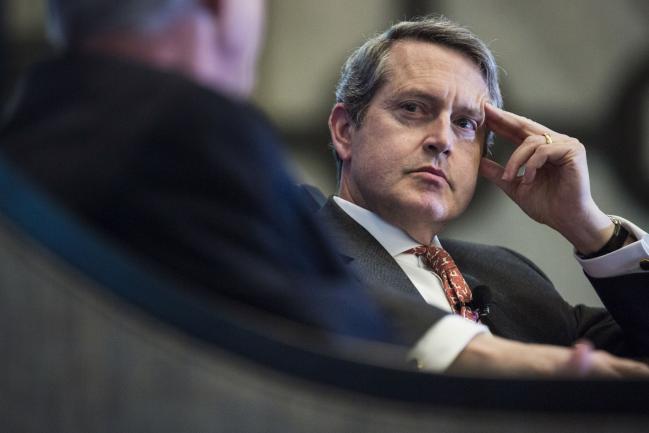 © Bloomberg. Randal Quarles, vice chairman of supervision at the Federal Reserve, listens during a panel discussion at the National Association of Business Economics’ (NABE) Economic Policy Conference in Washington, D.C., U.S. on Monday, Feb. 26, 2018. Quarles offered an optimistic view of the U.S. economy, suggesting it may be on the cusp of a sustained period of faster growth and reaffirming his support for
© Bloomberg. Randal Quarles, vice chairman of supervision at the Federal Reserve, listens during a panel discussion at the National Association of Business Economics’ (NABE) Economic Policy Conference in Washington, D.C., U.S. on Monday, Feb. 26, 2018. Quarles offered an optimistic view of the U.S. economy, suggesting it may be on the cusp of a sustained period of faster growth and reaffirming his support for (Bloomberg) — Hedge funds can rest easier for now.
Federal Reserve Vice Chairman for Supervision Randal Quarles said he doesn’t think the investment firms deserve the lion’s share of blame for tumult that swept financial markets in March — contrasting statements from other policy makers that the funds’ overly leveraged Treasury trades were a crucial factor.
“Our view is that was not a significant source of the pressure that we were seeing in the Treasury market,” Quarles, who also heads the Financial Stability Board of global regulators, said Tuesday during a University of Maryland webinar. Still, he added that market watchdogs lack the “granular data” to fully substantiate that assessment.
The comments are significant because Quarles has been leading an effort by global central banks to examine whether hedge funds and other non-bank financial firms should face more oversight.
Hedge funds have feared that regulators would clamp down on them since June when the Bank for International Settlements called the firms’ rapid unwinding of so-called basis trades “a key driver” of the March turmoil. The transactions involve buying Treasury securities using leverage via repurchase pacts while simultaneously selling futures contracts.
Read More: Fed Headed for a Clash With Hedge Funds, Other Shadow Banks
Treasuries are normally a safe haven for investors. But the securities whipsawed in March after governments locked down their economies due to the coronavirous, prompting a frantic dash for cash that engulfed financial markets. The Fed was forced to intervene to restore order to the U.S. government debt market, purchasing hundreds of billions of dollars of Treasuries and setting up a lending facility to backstop brokers.
Quarles said the selling of Treasuries by foreign central banks appears to have had a bigger impact in March than hedge funds’ basis trades. That comment echoes the conclusion of a recent study by Harvard University professor Marco di Maggio that was commissioned by a hedge fund industry lobbying group, the Washington-based Managed Funds Association.
Read More: Hedge Funds Reject Central Banker Criticism on Volatility
In a July 14 letter to central bank chiefs and finance ministers of the Group of 20 leading nations, Quarles seemed more in the camp of those sounding alarms about money market and hedge funds. Wearing his hat as FSB chief, he argued then that their March activity had forced the hands of global regulators. The FSB is close to concluding an investigation into what happened, expecting to release the results around the time of G20 meetings in October and November, Quarles said Tuesday.
While Quarles has spoken often in recent months about the need to increase oversight of non-banks, he indicated Tuesday that he doesn’t want to subject the firms to bank-like rules that would govern how much capital and liquid assets they must hold and be aimed at ensuring their solvency. Instead, the FSB will concentrate on what Quarles called interconnectedness — the relationships that firms have with each other that can rapidly spread panic through the financial system.
Quarles, whose term as Fed vice chairman ends in October 2021, also left open the possibility that the agency might tweak bank regulations to allow them to play a bigger role in providing liquidity to financial markets during times of stress.
“There was a certain element of pressure from the regulatory framework that limited the ability of some of the dealers to expand holdings given the dash for cash,” he said.
©2020 Bloomberg L.P.
Fusion Media or anyone involved with Fusion Media will not accept any liability for loss or damage as a result of reliance on the information including data, quotes, charts and buy/sell signals contained within this website. Please be fully informed regarding the risks and costs associated with trading the financial markets, it is one of the riskiest investment forms possible.




0 Comments:
Post a Comment